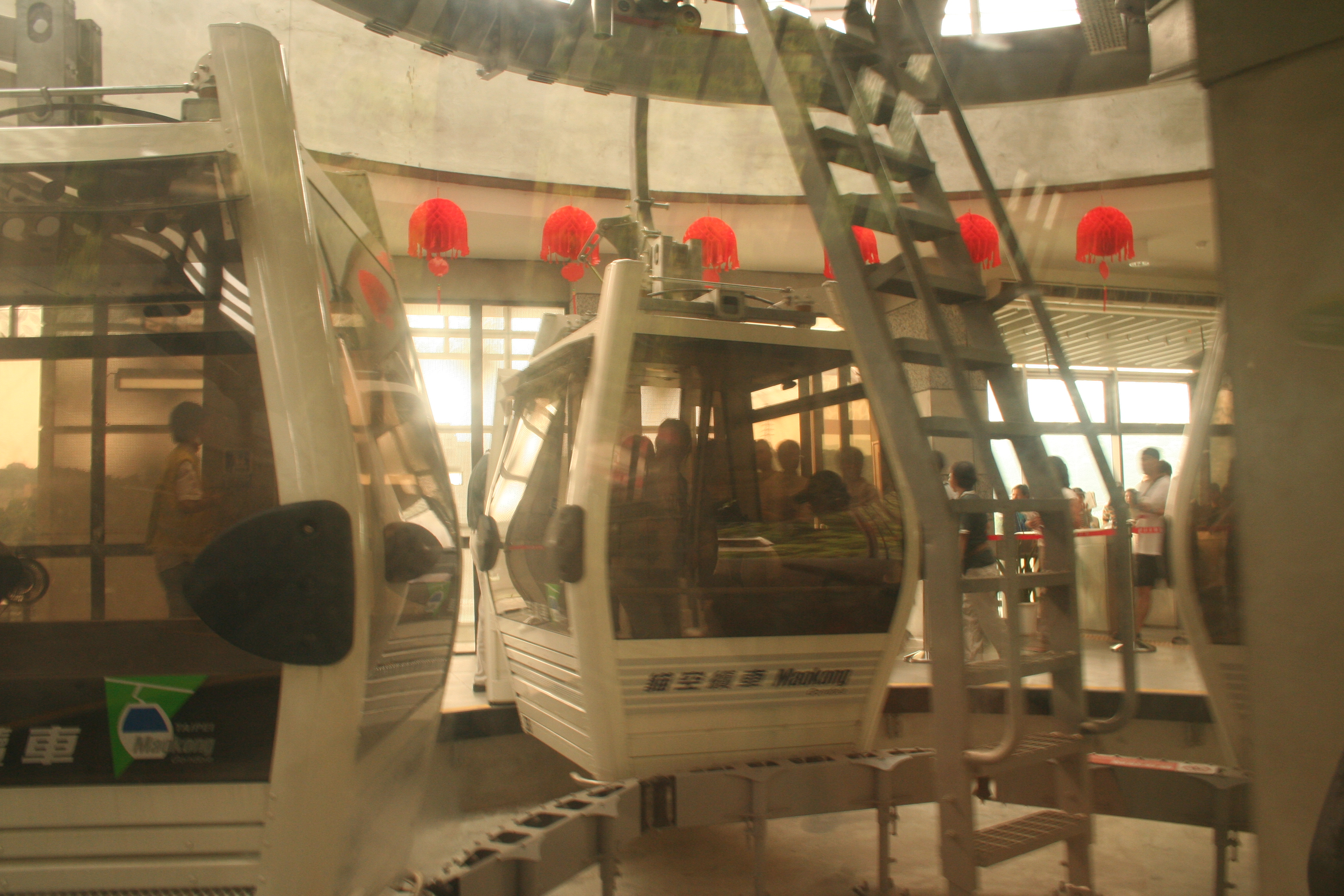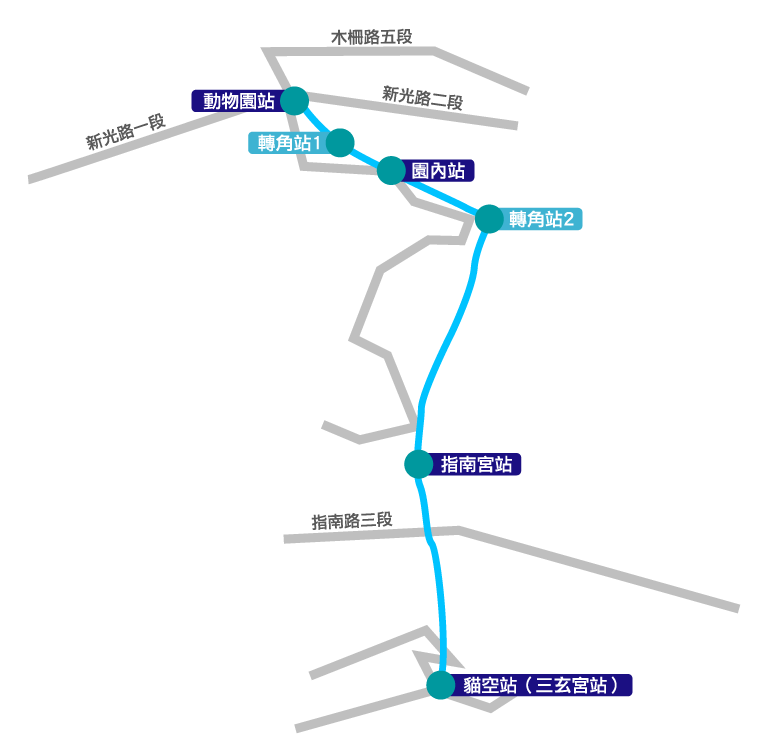Maokong Gondola on:
[Wikipedia]
[Google]
[Amazon]
The Maokong Gondola () is a

 The line has four stations:
On leaving Zhinan Temple or Maokong Stations, regular and frequent minibus services can ferry visitors to destinations around the Maokong area. Minibus services can also deliver passengers directly back to the Taipei Zoo
The line has four stations:
On leaving Zhinan Temple or Maokong Stations, regular and frequent minibus services can ferry visitors to destinations around the Maokong area. Minibus services can also deliver passengers directly back to the Taipei Zoo



Maokong official tourism website
Maokong Gondola
{{coord missing, Taiwan
gondola lift
A gondola lift is a means of cable transport and type of aerial lift which is supported and propelled by cables from above. It consists of a loop of steel wire rope that is strung between two stations, sometimes over intermediate supp ...
transportation system in Taipei
Taipei (), officially Taipei City, is the capital and a special municipality of the Republic of China (Taiwan). Located in Northern Taiwan, Taipei City is an enclave of the municipality of New Taipei City that sits about southwest of the n ...
, Taiwan
Taiwan, officially the Republic of China (ROC), is a country in East Asia, at the junction of the East and South China Seas in the northwestern Pacific Ocean, with the People's Republic of China (PRC) to the northwest, Japan to the nort ...
. Opened on 4 July 2007, the Maokong Gondola operates between Taipei Zoo
The Taipei Zoo, sometimes referred to as the "Muzha Zoo", is a public zoo, zoological garden in Wenshan District, Taipei, Taiwan. It is the most famous zoological garden in Taiwan and a leader in conservation biology, conservation, research and ...
and Maokong
Maokong () is an area located in Wenshan District of Taipei, Taiwan. The area used to be the biggest tea growing area of Taipei. There are many intertwining footpaths which have been used to transport tea. Now, it is a popular place for tea culture ...
. The line has four passenger stations. The facilities of the gondola were contracted to the French company Poma
Poma, incorporated as Pomagalski S.A., and sometimes referred to as the Poma Group, is a French company which manufactures cable-driven lift systems, including fixed and detachable chairlifts, gondola lifts, funiculars, aerial tramways, people ...
.
Stations

 The line has four stations:
On leaving Zhinan Temple or Maokong Stations, regular and frequent minibus services can ferry visitors to destinations around the Maokong area. Minibus services can also deliver passengers directly back to the Taipei Zoo
The line has four stations:
On leaving Zhinan Temple or Maokong Stations, regular and frequent minibus services can ferry visitors to destinations around the Maokong area. Minibus services can also deliver passengers directly back to the Taipei Zoo MRT
MRT may refer to:
Transport Rapid Transit Systems
* Mass Rapid Transit (disambiguation)
* MRT (Singapore) or Mass Rapid Transit, Singapore
* MRT (Bangkok) or Metropolitan Rapid Transit, Thailand
* Manila Metro Rail Transit System, Philippine ...
station.
Fares
When operating, the fares are based on the number of stations traveled: *1 Station: NT$70 *2 Stations: NT$100 *3 Stations: NT$120 Concessional fares are available to disability and seniors aged over 65. *1 Station NT$15 *2 Stations NT$20 *3 Stations NT$25 Fares can be paid by either purchasing the tickets at the stations or usingEasyCard
The EasyCard is a contactless smartcard system operated by the EasyCard Corporation, which was previously named the "Taipei Smart Card Corporation", for payment on the Taipei Metro (also known as "''Taipei MRT''", or "Taipei Rapid Transit Syst ...
or stored-value card
A stored-value card (SVC) is a payment card with a monetary value stored on the card itself, not in an external account maintained by a financial institution. This means no network access is required by the payment collection terminals as funds ...
. Each adult ticket can bring 2 children for free. Discounts are available for group travelling. Groups of 10 or above will receive 20% off their ticket price while groups of 40 or above will receive 30% off.
Tourists can also purchase the Maokong Gondola version of the one-day Taipei Pass for unlimited rides on Taipei bus
The Taipei Joint Bus System () is a bus system that serves the greater metropolitan area of Taipei, Taiwan. It is administered by the Taipei Joint Bus Service Management Center, the Taipei City Traffic Bureau, and the New Taipei City Traffic Bure ...
es and MRTs, and up to 3 gondola rides in one day. This special one-day Taipei Pass The Taipei Pass (), or the Taipei Tourism Passport, is a travel pass issued by the Traffic Bureau commissioned EasyCard Corporation in Taipei. First issued in November 2006, it is available for periods of 1, 2, 3, or 5 days. Once a pass is purchased ...
costs NT$350.
Reported issues



Safety concerns and repairs
The system was closed for 16 months due to safety concerns and repair efforts. It was reopened in April 2010.Ventilation problems
Ventilation in each passenger cabin has been criticized as being inadequate so that passengers should be forewarned that the cabin may become extremely hot and humid, especially in the midday sun. This has been largely mentioned when the Maokong Gondola began operating with several "halts" during service hours, trapping the mid-day heat within the cabins. Recommendations have been made to equip cable cars with solar panels to generate power for ventilation or fans.Service interruptions and technical problems
On the first day of operation, a faulty door lock left MayorHau Lung-pin
Hau Lung-pin (; born 22 August 1952) is a Taiwanese politician. As a member of the New Party, he was elected to the Legislative Yuan in 1995, and resigned his seat to lead the Environmental Protection Administration in 2001. Hau stepped down ...
and former Mayor Ma Ying-jeou
Ma Ying-jeou ( zh, 馬英九, born 13 July 1950) is a Hong Kong-born Taiwanese politician who served as president of the Republic of China from 2008 to 2016. Previously, he served as justice minister from 1993 to 1996 and mayor of Taipei from ...
suspended for 10 minutes in mid-air. Later, bad weather also caused operations to shut down a few times. Violent thunderstorms returned the next day and operation was suspended for a few hours.
At 4:50 p.m. on 21 July 2007, the service on the gondola system was suspended for approximately 2 hours due to a mechanical glitch, trapping 323 people on the cable cars. The evacuation took place from 5:50 p.m. through 6:55 p.m. TRTS personnel reimbursed passengers by giving them NT$1,058 and free tickets
Ticket or tickets may refer to:
Slips of paper
* Lottery, Lottery ticket
* Parking violation, Parking ticket, a ticket confirming that the parking fee was paid (and the time of the parking start)
* Ticket system, Toll ticket, a slip of paper use ...
worth NT$100 each. The system resumed normal operations at noon the following day.
On 24 July 2007, the service on the gondola system was suspended twice. Service was suspended at noon for around two hours due to a thunderstorm
A thunderstorm, also known as an electrical storm or a lightning storm, is a storm characterized by the presence of lightning and its acoustic effect on the Earth's atmosphere, known as thunder. Relatively weak thunderstorms are someti ...
, and again at 3:10 p.m. due to mechanical problems. No passengers were trapped on the gondola cars. Consumers' Foundation, Taiwan recommended that the Maokong Gondola should shut down completely, and only re-open after evaluating and repairing all systems.
Originally the Maokong Gondola was closed to public every Monday for maintenance servicing, in accordance to an agreement with Taipei City Hall
The Taipei City Hall (), the seat of Taipei City government, is located at Xinyi Special District, Xinyi District, Taipei, Taiwan.
The height of building is 54.42 m, the floor area is 196,684.59m2, and it comprises 12 floors above ground, as w ...
. In July 2008, a full week of maintenance was also done.
On 2 October 2008 the Maokong Gondola was closed pending structural repair after mudslides left a 2.5 meter gap beneath a support pillar.
Environmental concerns
Local environmental protection groups such asGreen Party Taiwan
Green Party Taiwan is a political party in Taiwan established on 25 January 1996. Although the party is sympathetic to Taiwan nationalism and shares a number of centre-left positions with the Pan-Green Coalition, the party emphasizes campaign ...
and Homemaker's Union have discouraged people from using the gondola lift. Local residents have complained about excessive noise during operation, increased garbage and the danger of mudslides.
Tests conducted by the Environmental Protection Administration
The Environmental Protection Administration, Executive Yuan (EPA, ) is a cabinet-level executive agency responsible for protecting and conserving the environment in the Republic of China (Taiwan). This also includes, air quality, noise control, m ...
under the Executive Yuan and the TCG Department of Environmental Protection have shown that noise levels are within regulations. To mitigate environmental damage, construction pillars and excavation were minimized.
On 2 November 2008, concerns were legitimized when a mudslide and earthquake eroded pillar T16, which now hung 2.5 meters above ground. The System was then closed for repairs and was reopened before April 2010 after inspectors found that the design, construction method, and engineering quality all met with requirements.
Typhoon Jangmi and erosion of pillar foundation
Rains associated with Typhoon Jangmi caused erosion around a pillar on the Corner 2 Station. As a result, on 1 October 2008 operations of the Gondola were suspended for one month to allow a full safety inspection to be carried out. On December 1, investigators recommended the relocation of pillar T16, the foundation of which had been eroded by the rainfall of four typhoons and was very unlikely to withstand future earthquakes. Relocating T16 and neighboring pillars took two years. The gondola officially resumed service as of 31 March 2010, after relocation of the pillar and passing safety inspections. These and other problems have contributed to the system's consistent financial losses.Crystal cabins
Since 30 March 2010, thirty cabins have been retrofitted with 48mm thick glass bottoms, each weighing 213 kg. They operate with a service interval of three minutes. The capacity is limited to five persons per cabin. Crystal cabins, also called “Eyes of Maokong Gondola”, have their own waiting queue and a computer managed ticketing system, instructing passengers to enter the queue at a specified time. Currently, the price for taking a crystal cabin is the same as that of regular cabins. The cost of each cabin modification was NT$200,000.See also
*Transportation in Taiwan
Transport (in British English), or transportation (in American English), is the intentional movement of humans, animals, and goods from one location to another. Modes of transport include air, land (rail and road), water, cable, pipeline, an ...
References and notes
External links
Maokong official tourism website
Maokong Gondola
{{coord missing, Taiwan